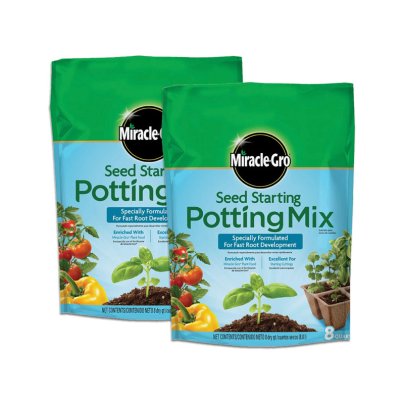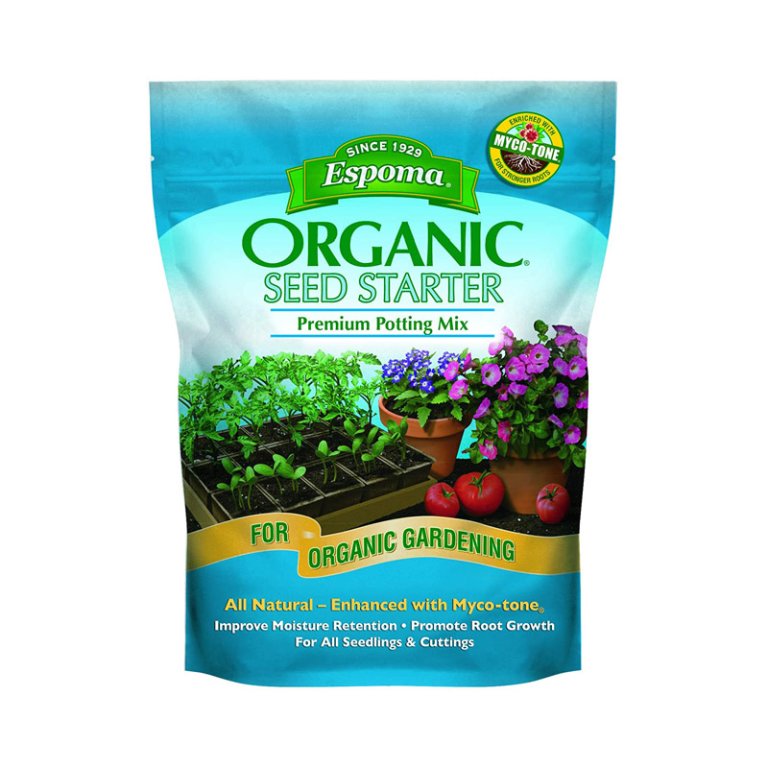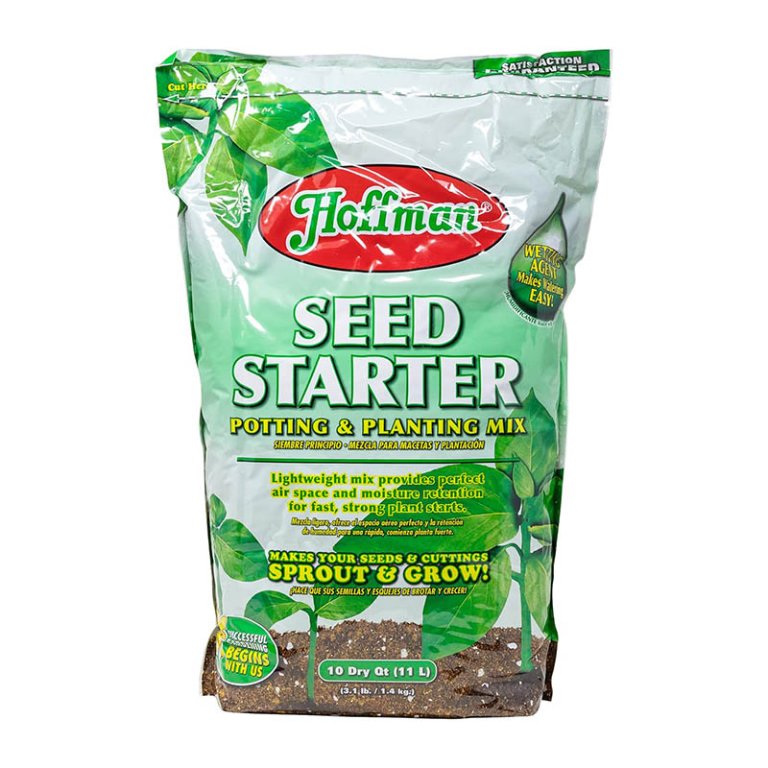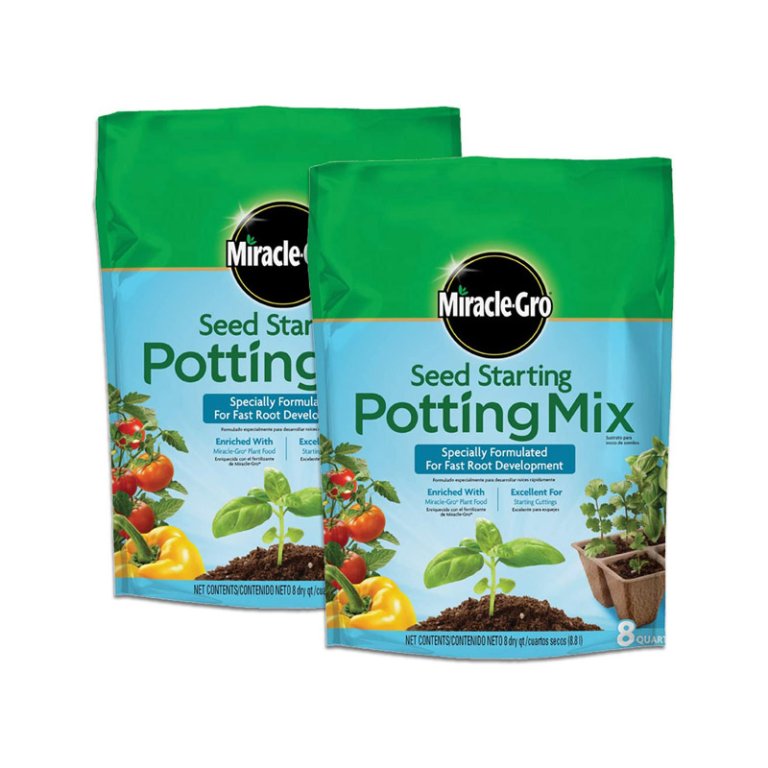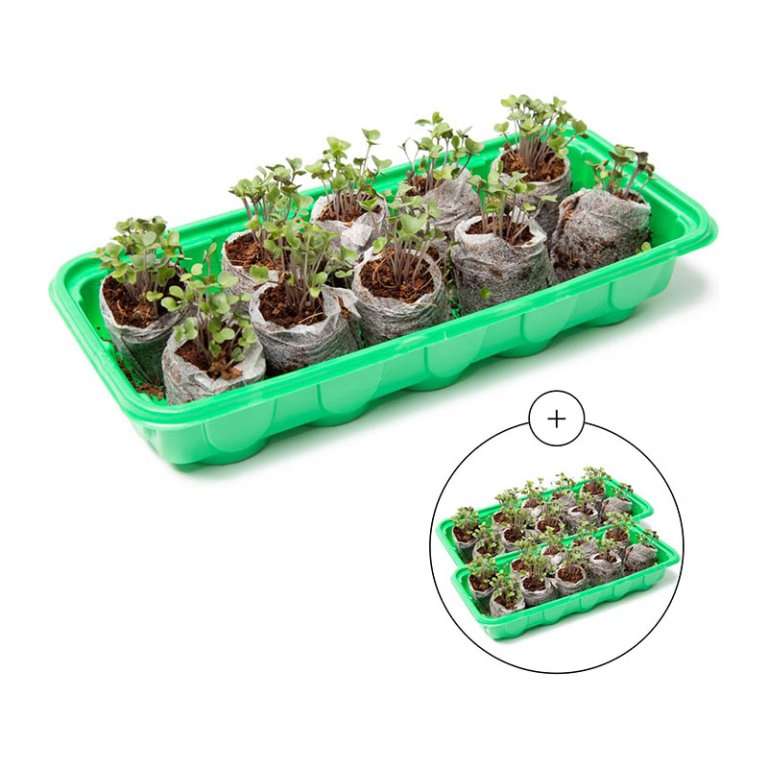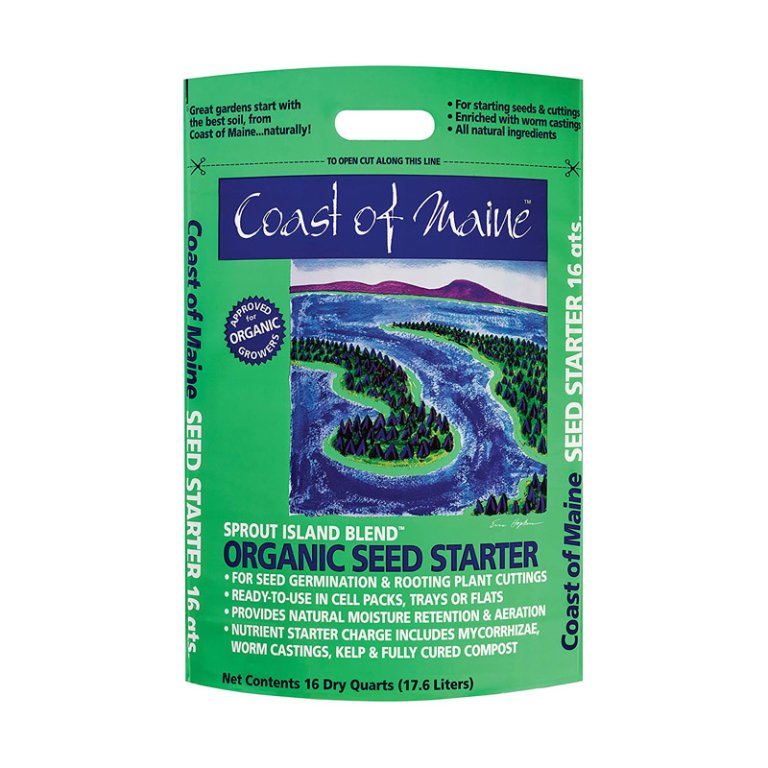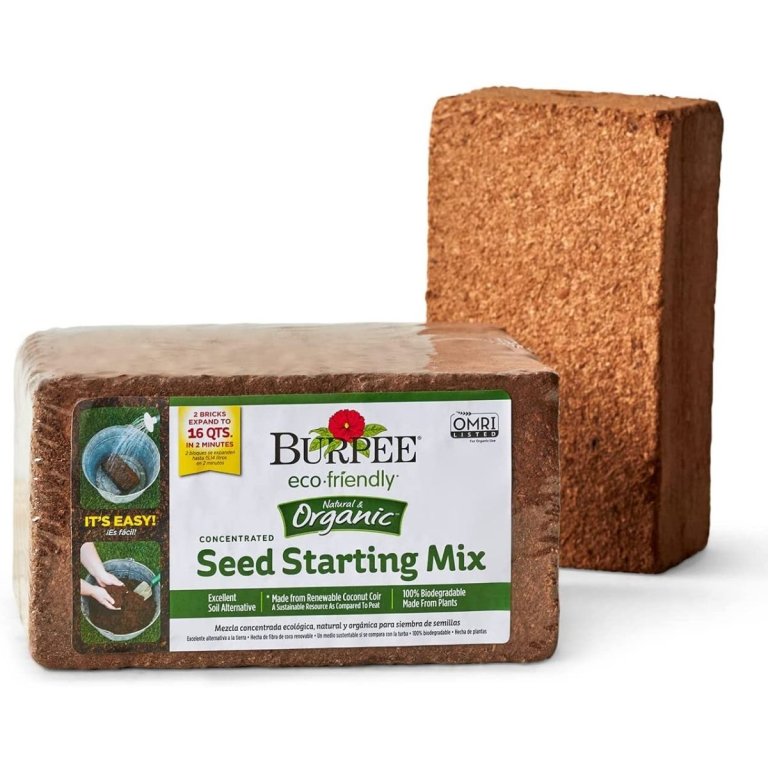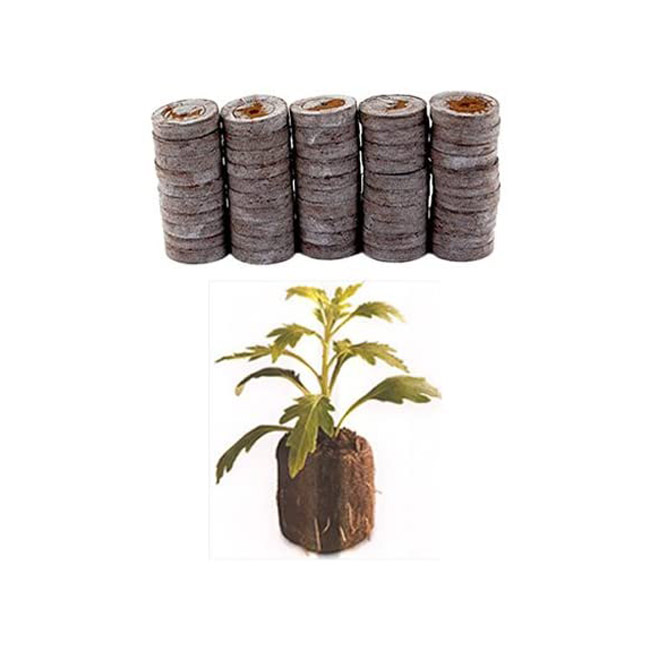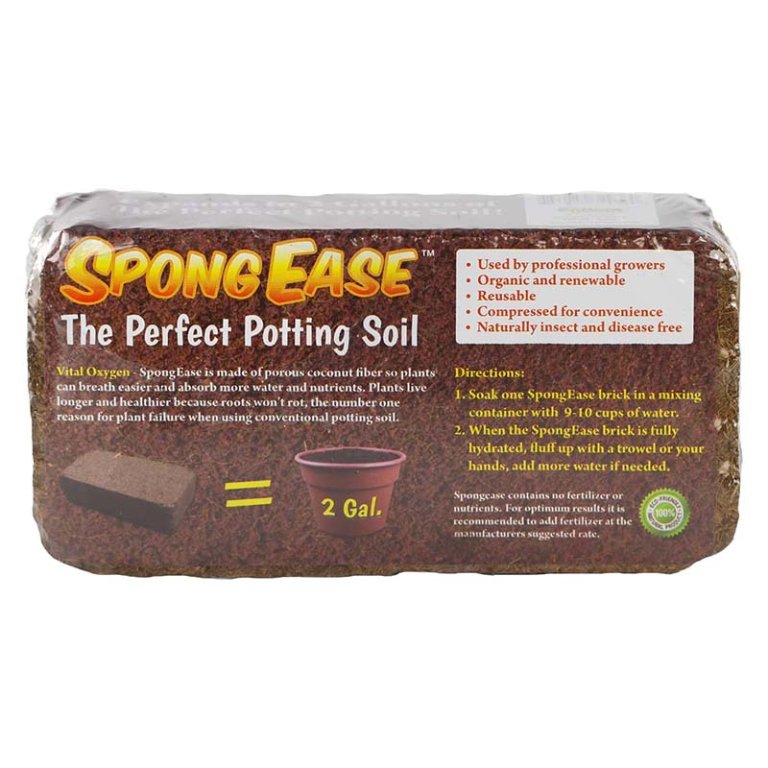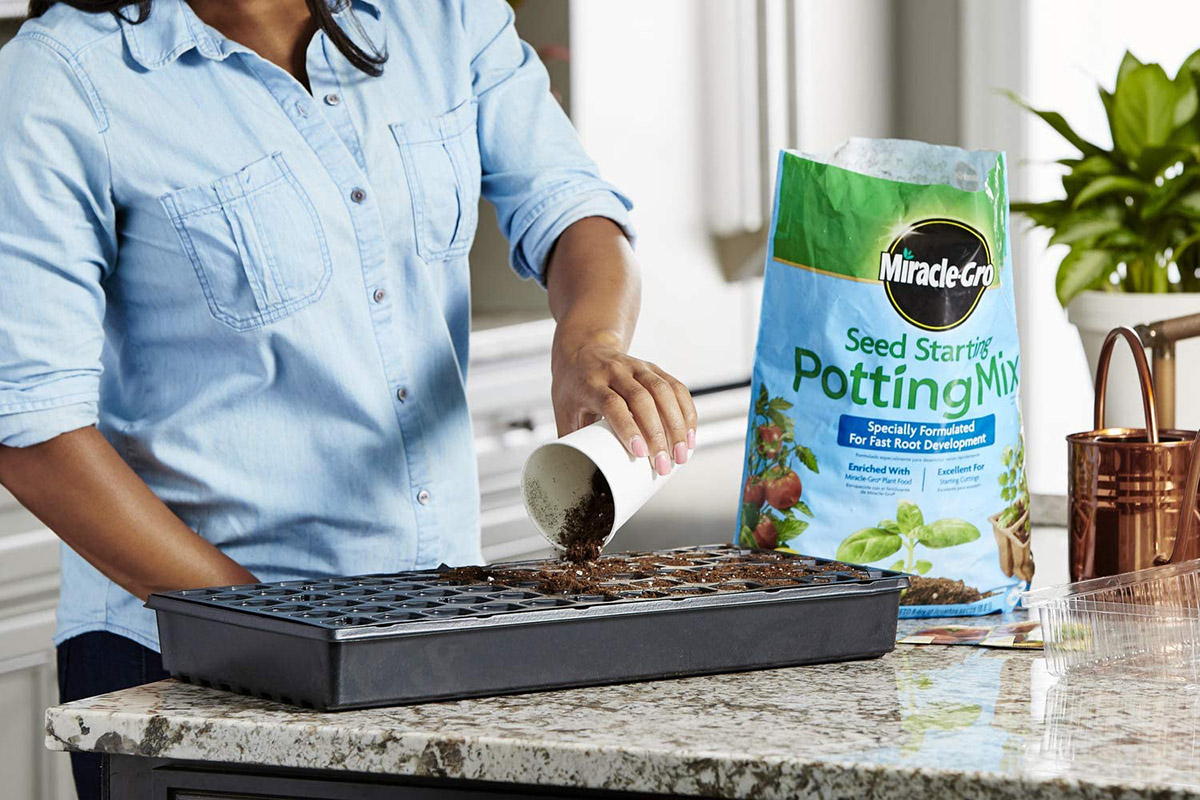
We may earn revenue from the products available on this page and participate in affiliate programs. Learn More ›
Seed starting mixes are clean and lightweight, offering an optimal foundation for seed germination. They come in various mediums, including loose grow mixes (similar to potting soil), expandable coconut coir bricks, or easy-to-transplant pellets.
Unlike regular garden soil, which can be too dense for tiny roots to expand, seed starting mixes are airy, providing the right environment for delicate roots to take hold. After researching more than 20 of the best grow mix options, our favorite is the Espoma Organic Seed Starter Premium Potting Soil Mix. It’s suitable for flowers and vegetables and is organic and non-compacting, encouraging the growth of healthy plants.
We also interviewed a horticulturist for expert opinion on the benefits and differences between each type of grow mix and how to incorporate them into your home gardening practices. Read on for some of the best seed starting mixes available today and some things to keep in mind while you shop.
- BEST OVERALL: Espoma Organic Seed Starter Premium Potting Soil Mix
↓ Jump to Review - RUNNER-UP: Hoffman Seed Starter Potting and Planting Soil
↓ Jump to Review - BEST BANG FOR THE BUCK: Miracle-Gro 8-Quart Seed Starting Potting Mix
↓ Jump to Review - BEST WINDOW KIT: Window Garden Mini Greenhouse Seed Starter Kit
↓ Jump to Review - BEST ORGANIC: Coast of Maine Sprout Island Organic Seed Starter
↓ Jump to Review - BEST COCONUT COIR: Burpee Organic Coconut Coir Seed Starting Mix
↓ Jump to Review - BEST STARTER PELLETS: Jiffy-7 36-Millimeter Peat Pellet Seed Starter Plugs
↓ Jump to Review - BEST PEAT-FREE: SpongEase Pro Coco Coir Brick
↓ Jump to Review
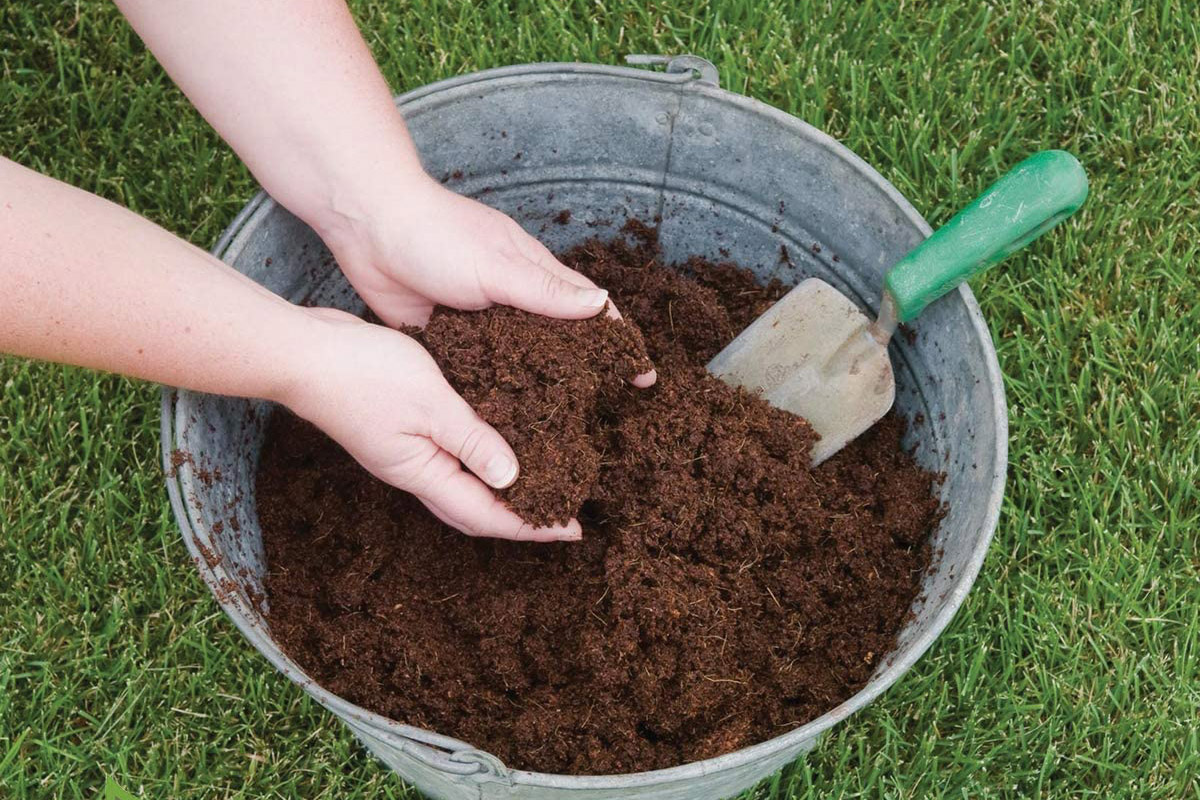
Before You Buy Seed Starting Mix
Before spring arrives, garden centers begin stocking large bags of growing medium, but don’t grab one without reading the label. Growing mixes come in various blends, some designed to amend outdoor garden beds, while others are for potted plants. Still others contain fertilizers for specific plants, such as “acid-loving” or “indoor.” Along with standard potting soil, most of these options are not suitable for starting seeds because they contain some contaminants. Choose a mix labeled for starting seeds to ensure it doesn’t contain traces of fungus or bacteria that could wipe out tiny seedlings.
| Ingredients | Quantity | Organic | |
| Espoma Organic Seed Starter Premium Potting Soil Mix | Sphagnum peat moss, perlite, limestone to adjust pH, and yucca extract | 8 or 16 quarts | Yes |
| Hoffman Seed Starter Potting and Planting Soil | Sphagnum peat moss, vermiculite, limestone, and a wetting agent | 4, 10, or 18 quarts | No |
| Miracle-Gro 8-Quart Seed Starting Potting Mix | Sphagnum peat moss, perlite, fertilizer, and a wetting agent | 8 quarts | No |
| Window Garden Mini Greenhouse Seed Starter Kit | 30- to 36-millimeter fiber soil | 3 trays with 10 cells each (30 cells total) | Unspecified |
| Coast of Maine Sprout Island Organic Seed Starter | Sphagnum peat moss; perlite, kelp meal, worm castings, lobster meal, dehydrated poultry manure, dolomitic lime, and well-aged compost | 8 or 16 quarts or 2 cubic feet | Yes |
| Burpee Organic Coconut Coir Seed Starting Mix | Compressed coir soil derived from coconut husks | 8 or 16 quarts | Yes |
| Jiffy-7 36-Millimeter Peat Pellet Seed Starter Plugs | Compressed peat moss | 50 pellets | Yes |
| SpongEase Pro Coco Coir Brick | Yes | 1 brick makes 2 gallons of soil | Yes |
Our Top Picks
Best Overall
Espoma Organic Seed Starter Premium Potting Soil Mix
What We Like
- All-natural potting mix for seedlings and root cuttings
- Helps improve moisture retention
- Noncompacting; intended to promote better root growth
- Suitable for vegetables and flowers
What We Don’t Like
- Some users report poor growth with certain plants
Specs
- Ingredients: Sphagnum peat moss, perlite, limestone to adjust pH, and yucca extract
- Quantity: 8 or 16 quarts
- Organic: Yes
Espoma’s organic seed starter mix contains all-natural ingredients, including sphagnum peat moss, peat humus (a decomposed ingredient from peat bogs), perlite, and Myco-tone, a proprietary blend of ingredients designed to help seedlings develop strong roots. This premium seed-starting mix retains moisture without compacting. Its all-natural formula helps when rooting cuttings, and it produces healthy plants with abundant blooms, making it well suited for both flowers and vegetables. This potting mix comes in an 8-quart or 16-quart bag.
Get the Espoma seed starting mix at Amazon, The Home Depot, TrueValue, or Walmart.
Runner-up
Hoffman Seed Starter Potting and Planting Soil
What We Like
- Lightweight, loose, and fertile soilless mix
- Specially formulated to promote seed germination
- Contains 6 components blended in proper proportions
- Also suitable for root cutting and transplanting
What We Don’t Like
- Takes some time to fully germinate some seeds
Specs
- Ingredients: Sphagnum peat moss, vermiculite, limestone, and a wetting agent
- Quantity: 4, 10, or 18 quarts
- Organic: No
This seed-starting mix from Hoffman, which comes in a 4-, 10-, or 18-quart bag, contains Canadian sphagnum peat moss, vermiculite, limestone (a pH adjuster), and a wetting agent. We like that this mix retains moisture while providing a light, airy growing medium that promotes seed germination and root development. Also use this seed-starting mix to root cuttings and in larger containers when transplanting seedlings. Ground limestone makes this mix work as a potting soil and for acid-loving plants, such as hydrangea or blueberries.
Get the Hoffman seed starting mix at Amazon, Kmart, or Walmart.
Best Bang for the Buck
Miracle-Gro 8-Quart Seed Starting Potting Mix
What We Like
- Enriched with Miracle-Gro Plant Food
- Formulated to boost root development
- Good choice when starting from seed
What We Don’t Like
- Intended for container use only
- Some users report a sour smell
Specs
- Ingredients: Sphagnum peat moss, perlite, fertilizer, and a wetting agent
- Quantity: 8 quarts
- Organic: No
From a manufacturer well-known in the gardening industry, this Miracle-Gro potting mix is specially formulated to boost root development. Miracle-Gro contains sphagnum peat moss, perlite, fertilizer, and a wetting agent. The mix helps retain moisture and drains well, and it won’t pack down.
The included fertilizer contains nitrogen, phosphate, and potash to help stimulate sprout growth, root development, and blooms. This Miracle-Gro product, which comes in an 8-quart bag, is suitable for starting root and leaf cuttings as well as starting seed trays. Also use it in larger containers when transplanting.
Get the Miracle-Gro seed starting mix at Amazon (2-pack), Ace Hardware, The Home Depot, Lowe’s (2-pack), or Tractor Supply Co.
Best Window Kit
Window Garden Mini Greenhouse Seed Starter Kit
What We Like
- 3 mini greenhouses are reusable
- Offers a moist, warm environment for seed germination
- Creates a better root system
- Makes new plants easy to transplant
What We Don’t Like
- Pricey compared to other seed starter kits
- Seeds must be purchased separately
Specs
- Ingredients: 30- to 36-millimeter fiber soil
- Quantity: 3 trays with 10 cells each (30 cells total)
- Organic: Unspecified
This Window Garden seed-starting kit features three grow trays that are small enough to fit on a windowsill. Each tray comes with 10 compressed coconut coir grow pods. A clear dome sits atop each tray to act as a mini-greenhouse and help keep the pods from drying out.
Put the fiber soil pods in the bottoms of the trays and add warm water; the pods will expand and become light and fluffy. Each pod contains only organic coconut coir. When the seedlings are ready for transplanting to garden soil, insert the entire pod in the garden.
Get the Window Garden seed starting mix at Amazon, Target, Bed Bath & Beyond, or Walmart.
Best Organic
Coast of Maine Sprout Island Organic Seed Starter
What We Like
- Designed specifically for germinating seeds and rooting cuttings
- All-natural fertilizer made with rich ingredients
- Provides ample drainage and water retention
What We Don’t Like
- Some users report poor consistency and mold
- Some say this mix attracts flies
Specs
- Ingredients: Sphagnum peat moss; perlite, kelp meal, worm castings, lobster meal, dehydrated poultry manure, dolomitic lime, and well-aged compost
- Quantity: 8 or 16 quarts or 2 cubic feet
- Organic: Yes
This Coast of Maine organic seed starting mix contains a blend of ingredients designed specifically for starting seeds and root cuttings, including sphagnum peat moss, perlite, aged compost, kelp meal, and worm castings. We appreciate that this mix also contains an all-natural fertilizer to encourage growth and help produce disease-resistant plants.
Coast of Maine seed starter is a lightweight, well-draining growing medium that won’t pack down, so tender seedling roots can develop. It retains moisture to help prevent roots from drying out. The mix comes in 8- and 16-quart bags. There’s also a 2-cubic-foot option.
Get the Coast of Maine seed starting mix at Amazon, The Home Depot, Target (2-pack), Ace Hardware, or Walmart.
Best Coconut Coir
Burpee Organic Coconut Coir Seed Starting Mix
What We Like
- Compact size; easy to store
- Expands to 8 quarts of soil when watered
- Ideal for seed starting
- Balanced pH improves nutrient absorption by seedlings
What We Don’t Like
- Dries out faster than other mixes
Specs
- Ingredients: Compressed coir soil derived from coconut husks
- Quantity: 8 or 16 quarts
- Organic: Yes
The compressed coconut coir in this seed-starting mix comes as an 8-quart, 7.25- by- 6- by-4-inch compressed brick. Just add water and crumble it to obtain 8 quarts of seed-starting mix. The Burpee Organic Seed Starting Mix contains only coconut coir to help promote plant and root growth.
Once expanded with water, use the coir in any seed-starting container, by itself or in combination with potting soil to grow larger plants. The material retains moisture yet won’t pack down.
Get the Burpee seed starting mix at Amazon, The Home Depot, or Burpee (2-pack).
Best Starter Pellets
Jiffy-7 36-Millimeter Peat Pellet Seed Starter Plugs
What We Like
- 50 pellets included
- Pods are biodegradable
- Suitable for transporting
What We Don’t Like
- Some user reports of mold growth
Specs
- Ingredients: Compressed peat moss
- Quantity: 50 pellets
- Organic: Yes
These Jiffy-7 peat pellets arrive in small, compressed discs but expand into fluffy grow pods when immersed in water. This soilless seed starting mix contains only compressed peat moss—nothing else. The user places a pellet in the bottom of a plastic flat or tray and pours in warm water to trigger expansion. When the expansion is complete, the pellet measures 1.5 inches by 1.5 inches, just large enough to insert a seed or two in the top of the peat moss.
The peat moss is held in place with a thin biodegradable net, and gardeners place the entire unit in the soil when transplanting to the garden or a larger pot. Buyers receive 50 compressed peat pellets per package.
Get the Jiffy-7 seed starting mix at Amazon, Grower’s Solution, or Walmart.
Best Peat-Free
SpongEase Pro Coco Coir Brick
What We Like
- Compact and easy to store when not using
- More environmentally friendly than peat moss products
- Affordable; product makes 2 gallons of soil
What We Don’t Like
- Grittier texture than other coco coir products
Specs
- Ingredients: Coconut coir
- Quantity: 1 brick makes 2 gallons of soil
- Organic: Yes
The SpongEase Pro Coco Coir Brick squeezes nutrients down to a compact brick full of goodness. Made of raw coconut coir, this fibrous block expands to a light texture designed to aerate, retaining moisture. At the same time, it provides a nutritious boost for starting seeds.
Gardeners can rehydrate the entire block to create 2 gallons of soil or hydrate only the amount needed to fill their seedling starter trays. The compressed packaging stores easily and provides options for a wide range of gardening needs and uses. This organic and eco-friendly starting mix for seeds makes a good substitute for peat since coco coir saturates more quickly than peat moss, although it dries out more quickly, so be aware of this when using.
Get the SpongEase seed starting mix at Amazon or The Home Depot (3-pack).
Jump to Our Top Picks
How We Chose the Best Seed Starting Mixes
We researched the most sought-after seed starting mixes in their respective categories and discovered that the best options are determined by their ingredients, form, quantity provided, and other special features included by top brands.
While searching for the best seeding mix available, the most effective and popular types among users for outdoor and indoor plant growth were potting soil mixes, pods, and sponges. These mixes included coconut coir, sphagnum peat moss, perlite, fertilizer, wetting agents, and even compost. We looked for versatile mixes that would grow everything from flowers to tomatoes from seed.
The seeding mixes allow for drainage, water-retention, root cutting, and transplanting while young seeds begin to grow. Many come with large quantities of up to 16 quarts or 50 pods or sponges. Plus, the majority of these picks are 100 percent certified organic seed starters.
What to Consider When Choosing the Best Seed Starting Mix
Most seed-starting mixes are soilless, which means they contain no dirt. While established plants may thrive in real garden soil or potting soil, the delicate roots of just-sprouted seeds may find it challenging to do so.
“Seed mixes are designed to create the perfect environment for seeds to germinate and develop their first roots,” says Michael Clarke, horitculturist and founder of Yardwork, based in San Juan Capistrano, California. “Because regular garden soil can be too dense and not drain well, the newly formed roots can become compacted or damaged from mold growth. The mixes also need to be lightweight, drain well, and sterile, to give seeds the best chance to thrive without the competition of soil-borne diseases or pests which can be present in garden soils.”
Ingredients
Most seed-starting mixes contain one or more of the following ingredients:
- Sphagnum peat moss: The most common base ingredient in seed-starting mixes, sphagnum peat moss is the decomposed material of sphagnum moss, a moss that grows in peat bogs. After it’s sterilized and dehydrated, sphagnum peat moss provides an optimal base for seeds to sprout; it’s absorbent yet won’t pack down. Peat moss, also popular for compressing into small pods, is called “peat pellets,” which expand into fluffy grow mix for starting seeds when immersed in water.
- Coconut coir: Removed from the outside of coconuts during the harvest process, coir is the fibrous layer that surrounds a hard coconut shell. Formerly discarded as a waste product, coir is now valued for its ability to retain moisture without compacting, making it well suited as an ingredient in seed-starting mixes. Like sphagnum peat moss, coir can be dehydrated and compressed into plugs for rehydrating and starting seeds.
- Perlite: Perlite is a byproduct of volcanic glass that’s been heated to high temperatures, resulting in a product that resembles puffy white beads. Perlite retains a small amount of moisture, but its primary purpose is to keep the growing mix from compacting.
- Vermiculite: Almost as light as perlite but highly absorbent, vermiculite is a silica mineral that’s mined from the earth. It’s in potting soil and seed-starting mix to lighten the mixture and help retain moisture.
- Diatomaceous earth (DE): This powdery natural product in some seed-starting mixes helps kill insects. Diatomaceous earth contains the finely ground fossils of tiny aquatic organisms known as “diatoms.” When insects come into contact with DE, the powder sticks to their bodies and acts as a desiccant to dehydrate and kill them.
- Lime: Powdered lime is in some seed-starting mixes to help lower the pH level of the mix to around 6 to 6.5 on the pH scale. The pH scale ranges from 0 to 14, with 7 considered neutral. Higher numbers indicate greater alkaline content, and lower numbers indicate more acidic content. Most plants grow well in soil with a pH level of around 6.5 to 7.
- Wetting agent: Completely dry grow mix ingredients initially resist absorbing water, so some manufacturers include a wetting agent (surfactant) that helps the material absorb water. A wetting agent, such as powdered kelp, is needed the first time the material is moistened.
Organic vs. Non-Organic
When a starter soil for seeds is labeled “organic,” gardeners know that all its ingredients are natural and contain no chemicals or synthetic agents. Most seed-starting mixes contain most, if not all, natural ingredients, but the inclusion of synthetic fertilizers disqualifies it as organic. An organic seed-starting mix may be more important to those who produce edible vegetables rather than flowers or ornamental plants.
Sterilization
Manufacturers remove fungi and bacteria from seed-starting mix by heating it to over 200 degrees Fahrenheit for a period of time, usually at least 30 minutes, to destroy pathogens that might kill tender seedlings. Depending on the manufacturer, heat may be applied by forcing steam through the material or by submerging the mixture in water and heating the water. Sterilizing the mixture gives delicate seeds their best chance at survival.
Aeration and Moisture Retention
A seed-starting mix should retain its lightness and loft, even when wet. Not only do new roots need moisture to grow, but they also need oxygen. Manufacturers add perlite and vermiculite to aerate the mix. Starting seeds in compact or heavy garden soil usually results in poor germination rates. Optimal seed-starting mixes retain just enough moisture for the mixture to stay damp to the touch while still providing the aeration necessary for roots to develop.
pH Levels
If a seed-starting mix is labeled as having “balanced pH,” the pH should fall between 6.5 and 7. Adjusting the pH level of a seed-starting mix isn’t always essential, since the natural ingredients in most mixes fall within the correct pH levels. Monitoring pH is more important if the plant is grown hydroponically (in water). pH adjusting solutions, known as “pH UP” and “pH DOWN,” are available to mix with the water in a hydroponic system to help maintain a neutral pH level.
Tips for Using Seed-Starting Mix
The best time to start seeds indoors depends on the type of seed and your USDA growing zone. Use a seed-starting mix rather than soil or potting mix to increase seed germination and get tiny seedlings off to a healthy start. Employ these tips to simplify the process and increase success.
- “It’s best to moisten the mix before planting seeds. It should be damp, but not soaking wet, to prevent the seeds from drying out too quickly,” says Clarke.
- If the tap water is high in mineral content, consider using distilled water to avoid creating a high alkaline pH environment.
- Consider wearing a dust mask when working with a dry seed-starting mix since some contain powdery, fine elements that can become airborne.
Clarke also cautions against watering plants too frequently. “It’s best to use seed liners or trays containing drainage holes to prevent water from sitting at the bottom,” he says.
FAQs
By using a seed starting soil, you increase the chance of successfully growing from seeds to transplant to the garden later. Frequently asked questions about seed starter mixes appear below.
None, actually! Avoid planting seeds in natural soil; instead, opt for a commercial seed-starting mix for optimal germination and survival rates when starting seeds indoors. The best indoor seedling starter mix only needs three ingredients for seeds to germinate: sphagnum peat moss (or coco coir), perlite, and vermiculite.
Potting soil is denser and may contain larger bits of ingredients, such as twigs or clumps. Potting soil for indoor plants usually does not drain as well as starting mix and is packed with richer nutrients (which seeds don’t actually need to germinate)
Seed starting mix is very fine and contains no large pieces, drains well, and helps prevent compacting inside the small seed starting cells or containers.
No, once it’s been used, it’s no longer sterile. But you can sprinkle leftover mix on the garden or blend it into a potted plant to help lighten the soil.
No. Seed starting mixes don’t have expiration dates. However, users should take care when storing unused starting mix to prevent mold growth or bugs.
Seedlings should be kept in a seed-starting mix for about 3-4 weeks or until the roots develop and become visible at the bottom of the tray or soil block.
Whether or not you should cover a seed to help it germinate depends on the type of plant you’re growing. In general, covering seeds with a dome or plastic will keep them damp, helping them germinate faster. However, fungal infections can take hold if you keep germinated seeds covered too long.
Seed starting mix should be damp to the touch but not soaking wet.
Why Trust Bob Vila
Bob Vila has been America’s Handyman since 1979. As the host of beloved and groundbreaking TV series including “This Old House” and “Bob Vila’s Home Again,” he popularized and became synonymous with “do-it-yourself” home improvement.
Over the course of his decades-long career, Bob Vila has helped millions of people build, renovate, repair, and live better each day—a tradition that continues today with expert yet accessible home advice. The Bob Vila team distills need-to-know information into project tutorials, maintenance guides, tool 101s, and more. These home and garden experts then thoroughly research, vet, and recommend products that support homeowners, renters, DIYers, and professionals in their to-do lists.


